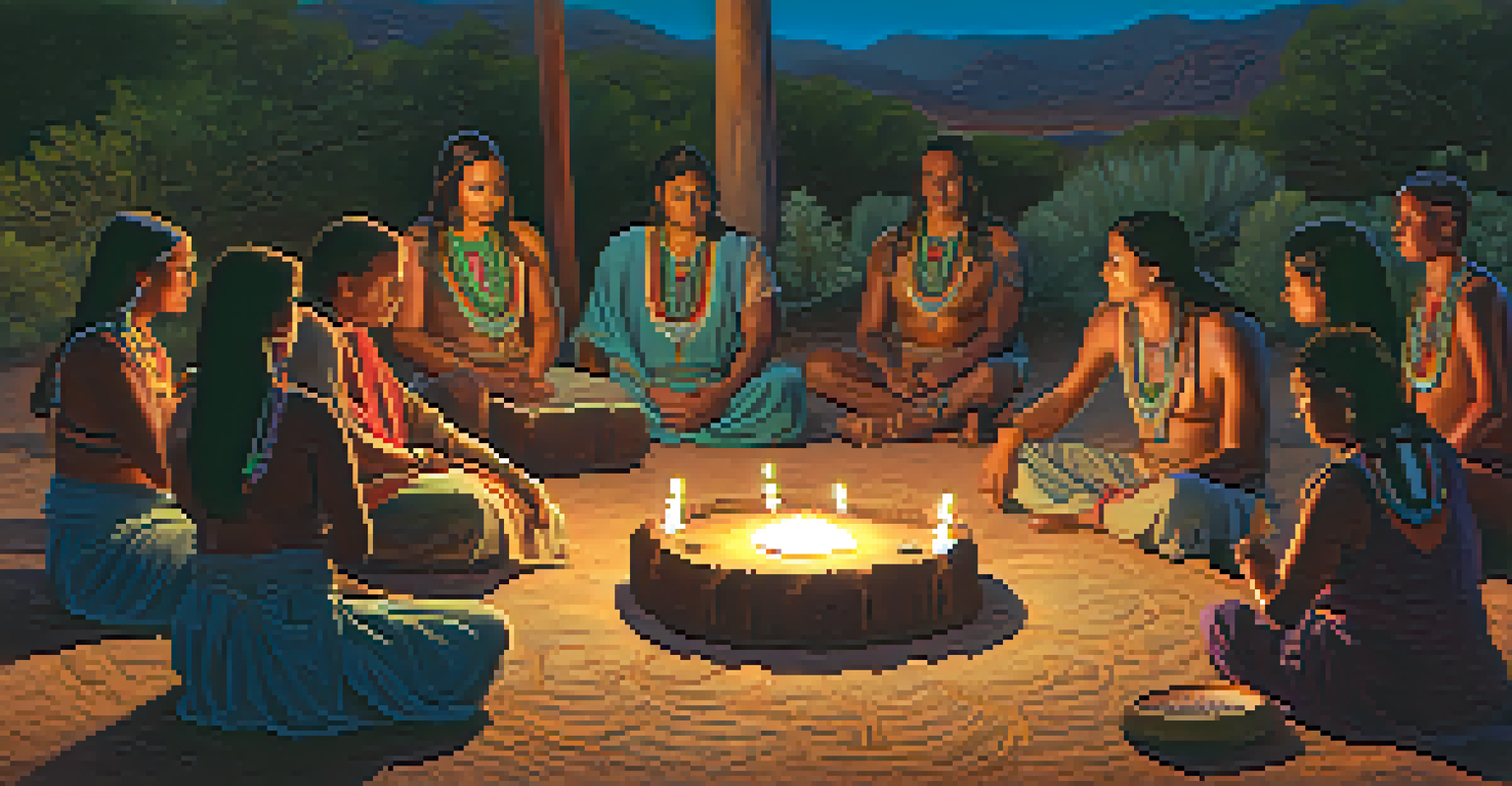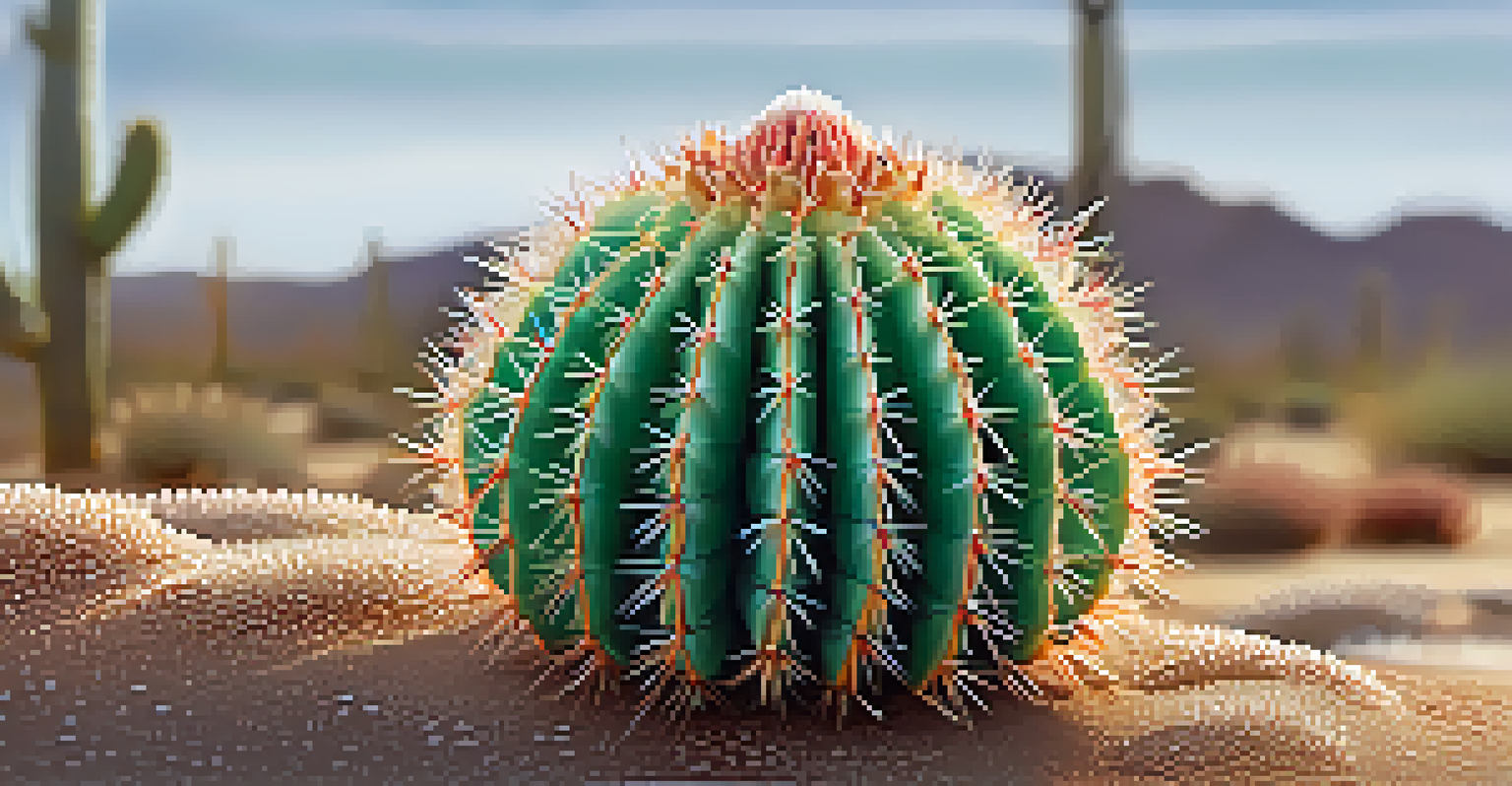Rituals and Practices Surrounding Peyote in Native Traditions

Understanding Peyote's Role in Native Traditions
Peyote, a small cactus native to Mexico and the southwestern United States, holds deep spiritual significance for many Native American tribes. Often associated with healing and visionary experiences, this sacred plant is central to various rituals and ceremonies. Its psychoactive properties have led to its use in spiritual contexts for centuries, allowing participants to connect with the divine and explore their inner selves.
Peyote is a gift from the Creator, intended to guide humanity towards greater wisdom and understanding.
For tribes like the Huichol and the Navajo, Peyote is more than just a plant; it embodies a bridge between the physical and spiritual worlds. This connection fosters a sense of community and shared purpose among participants. By incorporating Peyote into their rituals, these cultures honor their ancestors and maintain a rich tradition that has been passed down through generations.
In essence, Peyote serves as both a spiritual guide and a catalyst for personal transformation. Through its use, individuals often report profound insights and a deeper understanding of their place in the universe. This powerful relationship between the plant and its users underscores the importance of preserving these traditions for future generations.
The Peyote Ceremony: A Sacred Gathering
The Peyote ceremony is a sacred gathering that typically lasts all night, filled with singing, drumming, and prayer. Participants come together to partake in the Peyote experience, which is often led by a knowledgeable spiritual leader or shaman. This communal aspect fosters a strong bond among attendees, as they share their intentions and support one another throughout the journey.

During the ceremony, the Peyote is consumed in a specific manner, often prepared as a tea or eaten raw. The process is imbued with ritualistic significance, with prayers and songs that honor the spirit of the plant and the guidance it offers. These practices create an environment that encourages introspection, healing, and spiritual growth.
Peyote's Spiritual Significance
Peyote serves as a vital spiritual guide and a means of personal transformation for many Native American tribes.
As the night unfolds, participants may experience visions, emotions, and insights that can lead to personal revelations. This transformative experience is often viewed as a gift, allowing individuals to confront challenges and find clarity in their lives. Ultimately, the ceremony serves as a powerful reminder of the interconnectedness of all beings and the importance of community in spiritual practice.
Healing and Peyote: A Spiritual Path
Many Native American tribes view Peyote as a sacred medicine that promotes physical, emotional, and spiritual healing. The plant's psychoactive effects can facilitate deep introspection, allowing individuals to address personal traumas and emotional burdens. This healing aspect is particularly significant for those seeking solace from the struggles of modern life.
The future of Peyote practices relies on the younger generation’s engagement with their cultural heritage.
Through the Peyote experience, participants often report feelings of interconnectedness, love, and unity with the universe. This newfound perspective can lead to a greater understanding of oneself and one's purpose. The journey often encourages individuals to engage in healthier lifestyles and foster positive relationships within their communities.
Moreover, the healing properties of Peyote highlight the importance of traditional knowledge and holistic approaches to wellness. By embracing these practices, Native communities continue to promote resilience and strength in the face of adversity. This commitment to healing underscores the profound impact that Peyote has on individuals and the collective well-being of the tribe.
Peyote in Modern Context: Cultural Resilience
As modern society continues to evolve, the use of Peyote in Native American traditions remains a testament to cultural resilience. Many tribes actively work to protect their rights to use Peyote in religious practices, advocating for its preservation in the face of legal challenges. This fight for cultural sovereignty emphasizes the significance of these rituals in maintaining their identity.
In recent years, there has been a growing interest in Peyote among non-Native communities, leading to discussions about cultural appropriation and respect for indigenous practices. It's crucial to approach these traditions with sensitivity and understanding, acknowledging the deep history and significance that Peyote holds for Native peoples. Education and awareness can help foster respectful interactions between different cultures.
Cultural Resilience and Advocacy
Native communities actively work to protect their rights to use Peyote in rituals, emphasizing cultural sovereignty and identity.
Ultimately, the continued use of Peyote in contemporary rituals highlights the adaptability of Native American traditions. By embracing their heritage while navigating modern challenges, these communities demonstrate strength and commitment to their spiritual practices. This journey towards cultural preservation ensures that future generations can also experience the transformative power of Peyote.
The Symbolism of Peyote in Native Myths
Peyote is deeply woven into the fabric of Native American mythology, symbolizing spiritual enlightenment and connection to the cosmos. Various tribes have unique stories and legends that explain the origins and significance of this sacred plant. These narratives often emphasize the importance of harmony with nature and the spiritual lessons that Peyote offers.
For example, some tribes believe that Peyote was a gift from the Creator, intended to guide humanity towards greater wisdom and understanding. This belief reinforces the idea that the plant is not merely a tool for personal exploration, but rather a sacred entity deserving of respect and reverence. Such stories help to cultivate a sense of responsibility among users to honor the plant and its teachings.
By sharing these myths and traditions, Native communities pass on valuable cultural knowledge to younger generations. This storytelling practice not only preserves their heritage but also instills a sense of identity and belonging. The symbolism of Peyote serves as a reminder of the deep spiritual connections that exist within these rich traditions.
Challenges Facing Peyote Traditions Today
Despite its significance, the rituals surrounding Peyote face numerous challenges in today's world. Factors such as land loss, legal restrictions, and environmental concerns threaten the availability of this sacred plant. Many tribes are working tirelessly to advocate for their rights to access and utilize Peyote in their spiritual practices.
Additionally, the increasing commercialization of Peyote has raised concerns about authenticity and respect for traditional practices. As non-Native individuals seek to explore Peyote for personal use, it's essential to recognize the cultural significance of these rituals and approach them with the utmost respect. This situation emphasizes the importance of cultural sensitivity and understanding in preserving the integrity of these practices.
Challenges to Peyote Traditions
Peyote rituals face threats from legal restrictions and commercialization, highlighting the need for cultural sensitivity and education.
The challenges faced by Peyote traditions highlight the need for ongoing education and advocacy. By raising awareness about the importance of these rituals, we can support Native communities in their efforts to protect their cultural heritage. It's crucial for all of us to engage in meaningful conversations about respect, tradition, and the role of Peyote in spiritual practices.
The Future of Peyote Practices in Native Cultures
The future of Peyote practices in Native cultures is a topic of great interest and concern. As younger generations become more engaged in their cultural heritage, there is hope that these rituals will continue to flourish. Many tribes are actively working to teach the significance of Peyote to youth, ensuring that the traditions surrounding it are passed down.
In addition to education, the integration of modern technology and social media has provided new avenues for sharing knowledge about Peyote practices. Online platforms allow for greater visibility and understanding of these traditions, fostering connections between Native communities and those interested in learning. This increased exposure can also support advocacy efforts for the protection of Peyote and its cultural significance.

Ultimately, the resilience of Native cultures will play a critical role in the future of Peyote practices. By fostering a sense of pride and belonging, these communities can continue to honor their traditions while navigating the complexities of modern life. The enduring connection to Peyote serves as a powerful reminder of the strength and wisdom inherent in Native traditions.